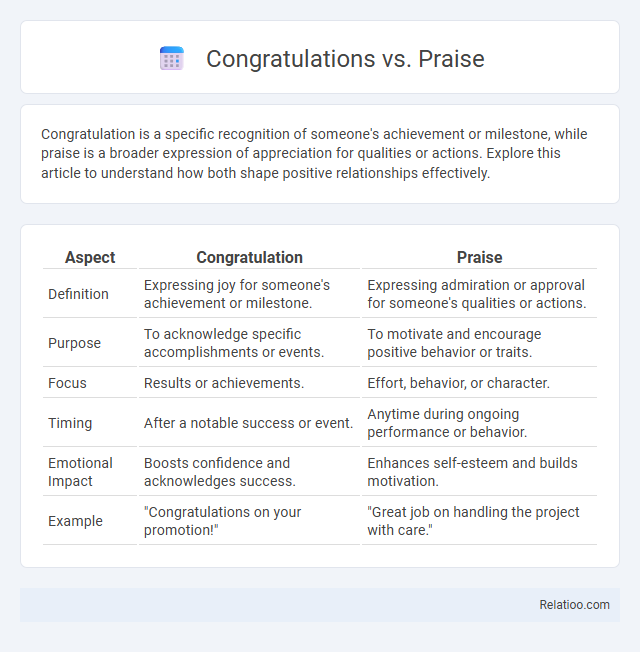Congratulation is a specific recognition of someone's achievement or milestone, while praise is a broader expression of appreciation for qualities or actions. Explore this article to understand how both shape positive relationships effectively.
Table of Comparison
| Aspect | Congratulation | Praise |
|---|---|---|
| Definition | Expressing joy for someone's achievement or milestone. | Expressing admiration or approval for someone's qualities or actions. |
| Purpose | To acknowledge specific accomplishments or events. | To motivate and encourage positive behavior or traits. |
| Focus | Results or achievements. | Effort, behavior, or character. |
| Timing | After a notable success or event. | Anytime during ongoing performance or behavior. |
| Emotional Impact | Boosts confidence and acknowledges success. | Enhances self-esteem and builds motivation. |
| Example | "Congratulations on your promotion!" | "Great job on handling the project with care." |
Understanding the Difference: Congratulation vs Praise
Congratulation is an expression of joy or acknowledgment for someone's achievement or special occasion, while praise involves actively commending someone's qualities, efforts, or actions. Understanding the difference helps you respond appropriately, as congratulations celebrate milestones, whereas praise motivates ongoing behavior and improvement. Your ability to distinguish these terms enhances communication by recognizing accomplishments versus encouraging positive traits.
Definitions and Core Meanings
Congratulation is the act of expressing joy or acknowledgment for someone's success or achievement, often given after a significant event like graduation or promotion. Praise involves expressing approval or admiration for someone's qualities, actions, or accomplishments, emphasizing positive reinforcement and encouragement. Understanding these distinctions helps you choose the appropriate term based on whether you acknowledge a specific achievement (congratulation) or commend ongoing qualities and efforts (praise).
Cultural Contexts of Congratulation and Praise
Congratulation and praise hold distinct cultural significance depending on societal norms and occasions; congratulation typically marks achievements or milestones like graduations or promotions, while praise often recognizes ongoing effort or character traits. In many cultures, congratulation is formal and occasion-specific, fostering a sense of accomplishment and respect, whereas praise can be informal and frequent, encouraging motivation and positive reinforcement. Understanding these cultural contexts helps you tailor communication effectively, ensuring your messages resonate appropriately in diverse settings.
Situational Use: When to Congratulate vs When to Praise
Congratulate is typically used to acknowledge specific achievements or milestones such as graduations, promotions, or awards, emphasizing success or accomplishment. Praise is more appropriate for recognizing qualities, efforts, or behaviors, like hard work, creativity, or kindness, without necessarily linking to a formal achievement. Congratulating is suited for formal or significant occasions, while praising fits informal or ongoing encouragement contexts.
Emotional Impact on Recipients
Congratulation conveys recognition of achievement, evoking feelings of pride and validation in recipients. Praise emphasizes specific qualities or actions, enhancing self-esteem and motivation through targeted positive feedback. Congratulation fosters a shared sense of accomplishment, strengthening social bonds and emotional connection.
Language and Expression: Words for Congratulation and Praise
Congratulation typically expresses recognition for achieving a specific milestone or success, frequently seen in phrases like "Congratulations on your promotion." Praise, on the other hand, focuses on admiration for qualities or efforts, often conveyed through expressions such as "Great job" or "Well done." Both serve crucial roles in communication, reinforcing positive behavior and accomplishments through language that fosters encouragement and motivation.
Congratulation in Professional and Academic Settings
Congratulation in professional and academic settings serves as a formal acknowledgment of achievements, such as promotions, graduations, or project completions, highlighting recognition of your hard work and success. Unlike praise, which often focuses on specific qualities or efforts, congratulation emphasizes the milestone or accomplishment itself, reinforcing motivation and confidence. Using congratulatory language appropriately strengthens professional relationships and fosters a positive environment that values achievement and growth.
Praise in Personal and Developmental Contexts
Praise in personal and developmental contexts directly supports Your growth by recognizing effort, progress, and specific achievements, fostering motivation and self-esteem. Unlike congratulation, which often marks a completed milestone, praise emphasizes ongoing improvement and encourages continued dedication to goals. Consistent, sincere praise helps build resilience and reinforces positive behaviors essential for personal and professional development.
Potential Pitfalls: Misusing Congratulation and Praise
Misusing congratulation and praise often leads to confusion between acknowledging specific achievements and offering genuine appreciation for ongoing effort. Congratulation is appropriate for celebrating concrete milestones or successes, whereas praise should be reserved for recognizing consistent behavior, qualities, or improvements. Overusing congratulation in contexts better suited for praise can dilute the impact of both, reducing motivation and clarity in communication.
Best Practices for Giving Effective Feedback
Effective feedback distinguishes between congratulation, praise, and commendation by focusing on specific achievements rather than general approval. You should give congratulation to acknowledge milestones, offer praise to reinforce positive behaviors, and use commendation to highlight exceptional efforts with concrete examples. Best practices include being timely, sincere, and clear to motivate continued growth and reinforce desired actions.

Infographic: Congratulation vs Praise
 relatioo.com
relatioo.com